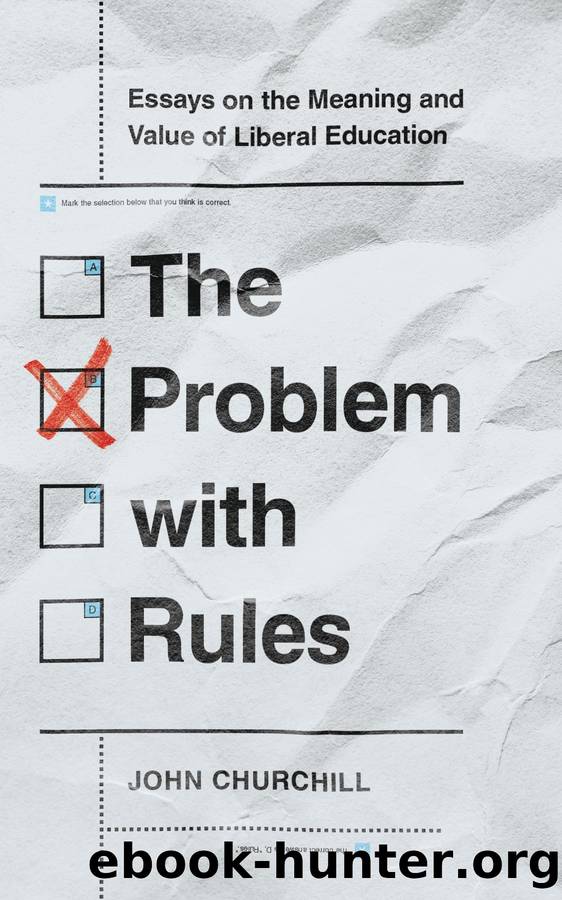The Problem with Rules by John Churchill;

Author:John Churchill; [Churchill, John]
Language: eng
Format: epub
Tags: REL051000 Religion / Philosophy, EDU032000 Education / Leadership
Publisher: Lightning Source Inc. (Tier 3)
Teaching Deliberation
How can we define the liberally educated person? It cannot be done according to what he or she knows, since there is no way to identify either necessary or sufficient knowledge. A liberally educated person is defined according to what she or he can do, namely, engage in deliberation. And by the possession of a disposition to deliberate. Still, knowing things is very important; if you donât know anything, you canât engage in deliberation. A liberally educated person knows how to push deliberative inquiry to consensus, or at least to clarity about being âstuckâ in disagreement, and clarity about why consensus is not being reached. The liberally educated person can cope with different ways of being âstuckâ and can explore them. For example, is there disagreement about the facts or about the framing or weighting of facts that are agreed upon?
If a liberally educated person is defined by characteristic skills and capacities, rather than some essential knowledge, it follows that no particular course of study designed to impart knowledge can be necessary or sufficient to impart liberal education. A student may absorb reams of information and make no progress toward becoming liberally educated, and some forms of instruction almost certainly inhibit the acquisition of liberal education. The Phi Beta Kappa Society was founded, for example, to be a discussion and debate groupâa deliberative bodyâin frustration over the lack of opportunity for acquiring those skills through the formal curriculum of William and Mary in the late eighteenth century.
The question whether deliberation can be taught is complex, because deliberation presupposes the confluence of several epistemological states and social skills. Aristotle reminds us, early in the Nicomachean Ethics, that people of judgment expect a degree of precision appropriate to the subject matter. No one, he notes, tolerates probable arguments in mathematics, or expects strict demonstration from an orator. And in Platoâs Republic we find the admonition that those who attempt to teach deliberation should avoid imparting a love of contention for its own sake, lest their students become like puppies, pulling and tearing at everything, and that it presupposes a certain level of maturity and good will.16 From Wittgenstein we have the image of inquiry that continually passes the same landmarks, viewing the landmarks from different points of view, and gaining a sense of the terrain.
Among the constituent elements of deliberative abilities are curiosity, at least some knowledge, honesty, imagination, generosity, vulnerability, restraint, tolerance of vagueness, ambiguity, uncertainty, reciprocity, frankness, civility, and freedom of expression. In what follows, these states and skills will be arrayed to display the context in which, alone, deliberation can be practiced. We will begin, fittingly, with curiosity.
What is curiosity? The concept is, itself, a curious one. Derived from a Latin word that means âcare,â as a noun it can refer to something that is odd or unusual, as in âHis study was filled with curiosities collected in his travels,â or to a state of more or less intense interest a person might hold toward something or someone, as in âHer curiosity was boundless.
Download
This site does not store any files on its server. We only index and link to content provided by other sites. Please contact the content providers to delete copyright contents if any and email us, we'll remove relevant links or contents immediately.
| Administration | Assessment |
| Educational Psychology | Experimental Methods |
| History | Language Experience Approach |
| Philosophy & Social Aspects | Reform & Policy |
| Research |
The Art of Coaching Workbook by Elena Aguilar(51148)
Trainspotting by Irvine Welsh(21625)
Twilight of the Idols With the Antichrist and Ecce Homo by Friedrich Nietzsche(18611)
Fangirl by Rainbow Rowell(9220)
Periodization Training for Sports by Tudor Bompa(8241)
Change Your Questions, Change Your Life by Marilee Adams(7727)
This Is How You Lose Her by Junot Diaz(6866)
Asking the Right Questions: A Guide to Critical Thinking by M. Neil Browne & Stuart M. Keeley(5747)
Grit by Angela Duckworth(5590)
Red Sparrow by Jason Matthews(5460)
Paper Towns by Green John(5168)
Room 212 by Kate Stewart(5096)
Ken Follett - World without end by Ken Follett(4712)
Housekeeping by Marilynne Robinson(4429)
The Sports Rules Book by Human Kinetics(4374)
Double Down (Diary of a Wimpy Kid Book 11) by Jeff Kinney(4257)
Papillon (English) by Henri Charrière(4247)
The Motorcycle Diaries by Ernesto Che Guevara(4078)
Exercise Technique Manual for Resistance Training by National Strength & Conditioning Association(4052)
